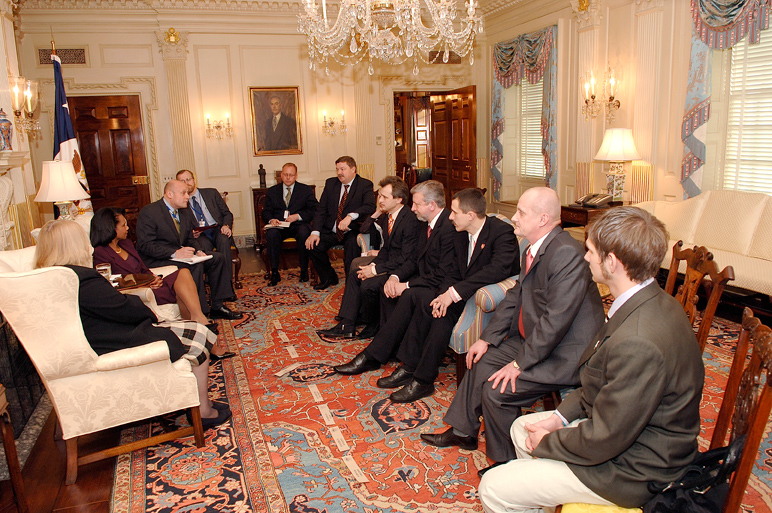The International Republican Institute (IRI) hosted a delegation of the Belarusian Unified Democratic Forces (UDF) coalition in Washington, DC from December 1-8, 2007, to brief U.S. government officials on the current political situation in Belarus, the increasing deterioration of human rights, and their preparations for the 2008 parliamentary elections.
Members of the delegation represented the unique diversity of the coalition, including: Aleksandr Milinkevich, former presidential candidate and leader of the nongovernmental organization For Freedom; three of the four co-chairs of the UDF, Anatoly Lebedko of the United Civic Party, Sergiy Kaliakin of the Belarusian Party of Communists, and Anatoly Levkovich of the Belarusian Social Democratic Party – Hramada; Pavel Severinets, co-founder of Belarusian Christian Democracy; Dmitriy Fedaruk, acting chairman of Malady (Young) Front; and Enira Bronitskaya, an independent human rights advocate, civil society activist and former political prisoner.
The delegation was honored to receive invitations to participate in private meetings with both President George W. Bush and Secretary of State Condoleezza Rice. Both the President and the Secretary expressed deep concern over the lack of democratic rights in Belarus and offered each of the delegation members the opportunity to tell their individual stories and speak about the most pressing needs facing Belarusian citizens. The delegation spoke of the plight of the political prisoners, the lack of freedom of religion and freedom of expression, and the vital need for Belarusian society to have access to unbiased and unfiltered information. Following their nearly one-hour meeting, President Bush took individual photos with each member while wearing the “For Freedom” bracelet that the delegation had given him at during their meeting.
On December 4, the delegation testified in a Congressional briefing hosted by the Helsinki Commission titled Belarus: Dictatorship or Democracy, chaired by Congressman Alcee Hastings (D-FL). Anatoly Lebedko, Aleksandr Milinkevich and Enira Bronitskaya each gave testimony and were joined by the other delegation members for a question-and-answer discussion with Congressmen and audience members. Chairman Hastings was particularly impressed by the testimony of Malady (Young) Front leader Dmitriy Fedaruk, praising him for his convictions and dedication.
The delegation spent a significant time in meeting on Capitol Hill meeting with members including Congressman Thaddeus McCotter, Chairman of the House Republican Policy Committee; Congressman Chris Smith, Ranking Member of the Commission on Security and Cooperation in Europe; Congressman John Shimkus, Chairman of the Baltic Caucus; and Senate Majority Whip Richard Durbin. Each member discussed potential public actions or speeches they could sponsor in the United States to support the UDF. During the visit with Congressman Smith, the delegation presented him with a plaque to thank him for his support. They were delighted to watch as he immediately hung the plaque in a prominent location in his office, replacing the news clipping of his first election to Congress.
The delegation also had the unique opportunity to participate in media interviews in the United States – something they are not able to do in their own country including a meeting with The Washington Post Editorial Board. At Radio Free Europe/Radio Liberty (RFE/RL), the delegation had the opportunity to participate in an on-air radio interview wherein they answered questions from Belarusian callers. Following this interview RFE/RL published an in-depth article on Dmitry Fedaruk and the Malady Front. The delegation also participated in television and radio interviews for Voice of America.
The delegation also used their visit for dialogue with other partners including the National Democratic Institute, the German Marshall Fund, the National Endowment for Democracy, the Project for Transitional Democracies, the “We Remember” Foundation, and the Belarusian-American community. After meetings with key U.S. government officials including Ambassador to Belarus Karen Stewart and former Ambassador to Belarus Mike Kozak; the delegation also met with the Ambassadors of Lithuania, Germany, Portugal and Slovenia to discuss how their European neighbors could assist them in their struggle.
The delegation returned to Belarus with renewed vigor and buoyed spirits. Unfortunately, the regime immediately began singling out and repressing members of the delegation. On December 12, Dmitry Fedaruk was brutally beaten by police and hospitalized due to his extensive injuries. Both he and fellow delegate Anatoly Lebedko have since been jailed for 15-day sentences, and Mr. Lebedko is currently barred from leaving the country.
However, due to the vital network of support the delegation built during their visit, their suffering at the hands of the Belarusian regime does not go unnoticed. In a floor statement before the U.S. Congress on January 15, Congressman Hastings sent this strong warning “…the Lukashenka regime can be assured that my colleagues and I on the Helsinki Commission are determined to stand by Anatoly Lebedka, Dzmitri Fedaruk and all those in Belarus – young and old – bravely struggling for freedom, democracy and respect for human rights.”
